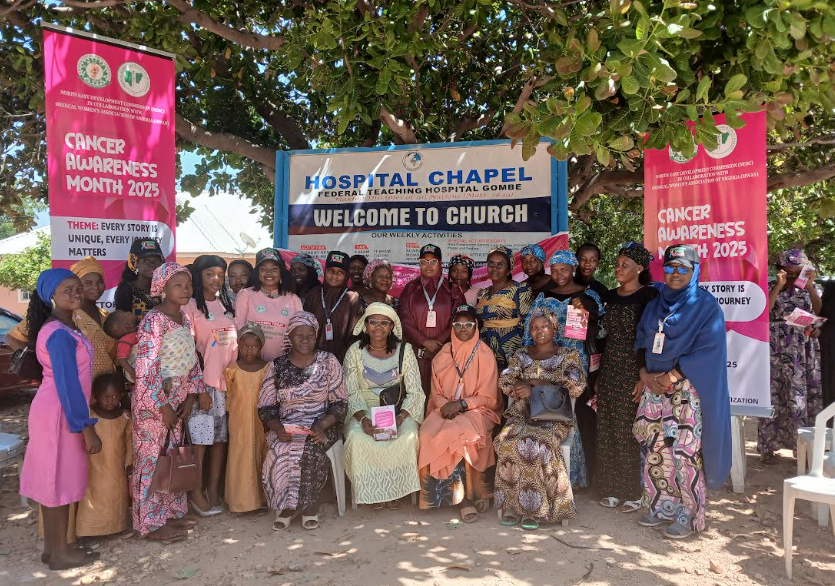Chima Azubuike
The North-East Development Commission, in collaboration with the Medical Women’s Association of Nigeria, Gombe State Chapter, has raised alarm over the scourge of cancers, particularly cervical and breast cancers, among women.
Speaking at the Hospital Chapel of the Federal Teaching Hospital, Gombe, on Sunday, the Registrar in the Department of Obstetrics and Gynaecology, Dr Fatima Bakari, said the association was working with the commission to mark the 2025 Cancer Awareness Month with the theme “Every Story is Unique, Every Journey Matters.”
According to her, the association will on Wednesday organise a road walk and, free screening exercise for residents in Gombe.
She said, “We are here to raise awareness on breast and cervical cancer. As you know, every year, October is the month when these cancer awareness campaigns are celebrated.
“This is November now—sorry—it’s supposed to be a month-long event. We started our activities toward the end of October, so it spilt into November.
“We want to raise awareness on these deadly diseases—cervical and breast cancer—as they are among the leading killers of women of reproductive age.
“The key is to raise awareness so that women will be conscious of their bodies and know how to protect themselves, as the key to prevention is early detection. Early detection plays a major role in preventing deaths that occur from these diseases.”
On the essence of bringing the campaign to the Federal Teaching Hospital Gombe Chapel, Bakari said, “Yes, we brought our campaign to the chapel because any gathering where we expect women and children—especially young girls who are exposed to either marital or extramarital activity—provides an opportunity for awareness on cervical cancer.
“We want them to know that screening is available. Like my colleague said, every woman who is sexually active is supposed to have that screening done every three years. The chapel is one of the places where we can reach such groups, so we go to chapels, mosques, marketplaces, and schools.
“We visited some schools and went to the mosque on Friday. Today, being Sunday, we decided to visit here to raise awareness on these diseases and give people hope that there is actually a way out, especially if the disease is detected early. That’s the whole essence of why we are here.”
According to the World Health Organisation, breast and cervical cancer are two of the most common cancers in women, with around 660,000 new cervical cancer cases and an estimated 2.3 million women diagnosed with breast cancer and 670,000 deaths in 2022.
WHO noted that the highest rates of cervical cancer incidence and mortality are in sub-Saharan Africa (SSA), Central America and Southeast Asia.
While calling for early screening, Bakari added, “My number one advice is that they should practice safe sex by using protection. Secondly, I would advise them to go to any nearby facility that offers screening and have the test done because it is very important.
“With cancers—whether breast or cervical—once symptoms begin to appear, it means the disease has already started spreading. So, before the stage of symptoms, we want women to go and get themselves checked.
“When detected early, there is actually a cure. Yes, it’s available. Actually, it’s even part of the national immunisation schedule now. Any child between the ages of 9 and 14 can get it free in any health facility. But for any child above 14, you’ll have to buy it.”
On symptoms, Bakari said, “Yes, symptoms—especially for breast cancer—include any swelling in the breast. That’s why self-examination is so important. It’s supposed to be done every month.
“So, anytime you detect any swelling, no matter how small, you should seek medical advice immediately.”
Earlier in her presentation, Dr Aishatu Musa, also from the Department of Obstetrics and Gynecology, Federal Teaching Hospital, Gombe, urged parishioners to allow their children to benefit from the free vaccination campaign.
Musa said, “Our children should get vaccinated. This Wednesday we should use this opportunity to come for screening—it’s free.”
A parishioner at the Teaching Hospital Chapel, Barrister Martha Daniel, expressed appreciation for the initiative. She said, “We are really excited to have MWAN come to sensitise women. You know, the reason it’s important for them to come is because sometimes we mix spirituality with myths when it comes to healthcare.”
Continuing, Daniel added, “Their coming has clarified many of those myths that surround health issues. We do not downplay the effect of spirituality, and we do not downplay the effect of science.
“But each of them can stand independently and can be of great value to human life if properly maximised.”
Copyright PUNCH
All rights reserved. This material, and other digital content on this website, may not be reproduced, published, broadcast, rewritten, or redistributed in whole or in part without prior express written permission from PUNCH.
Contact: [email protected]

